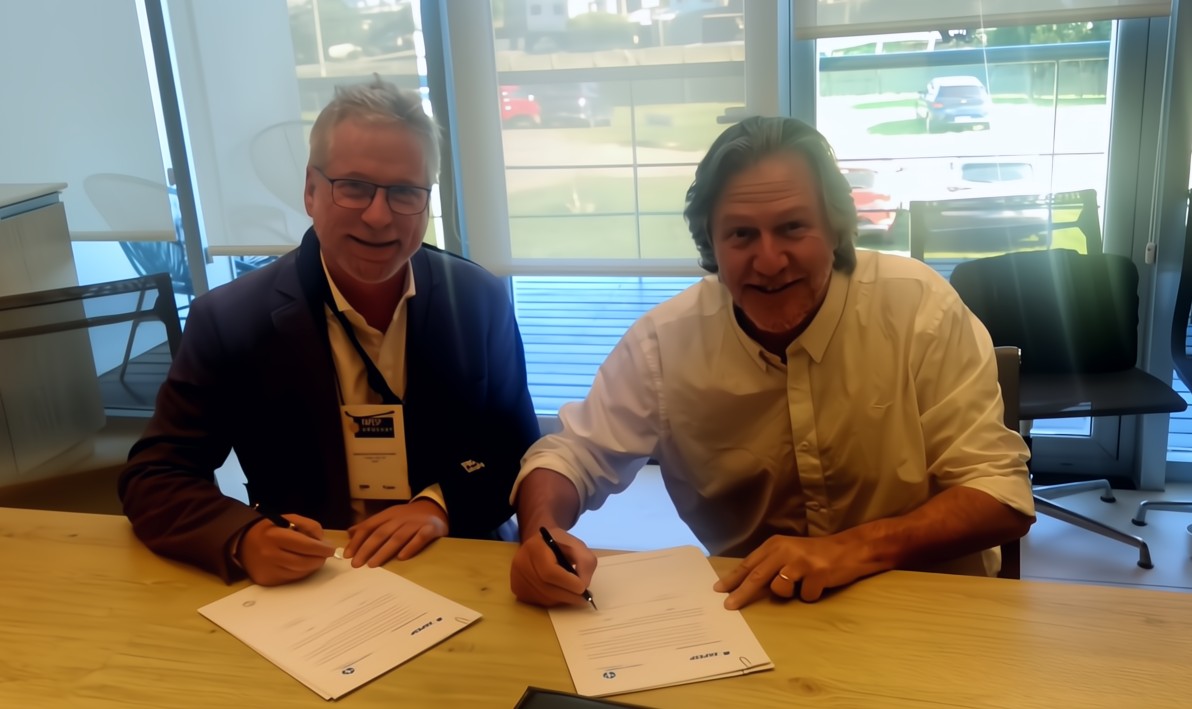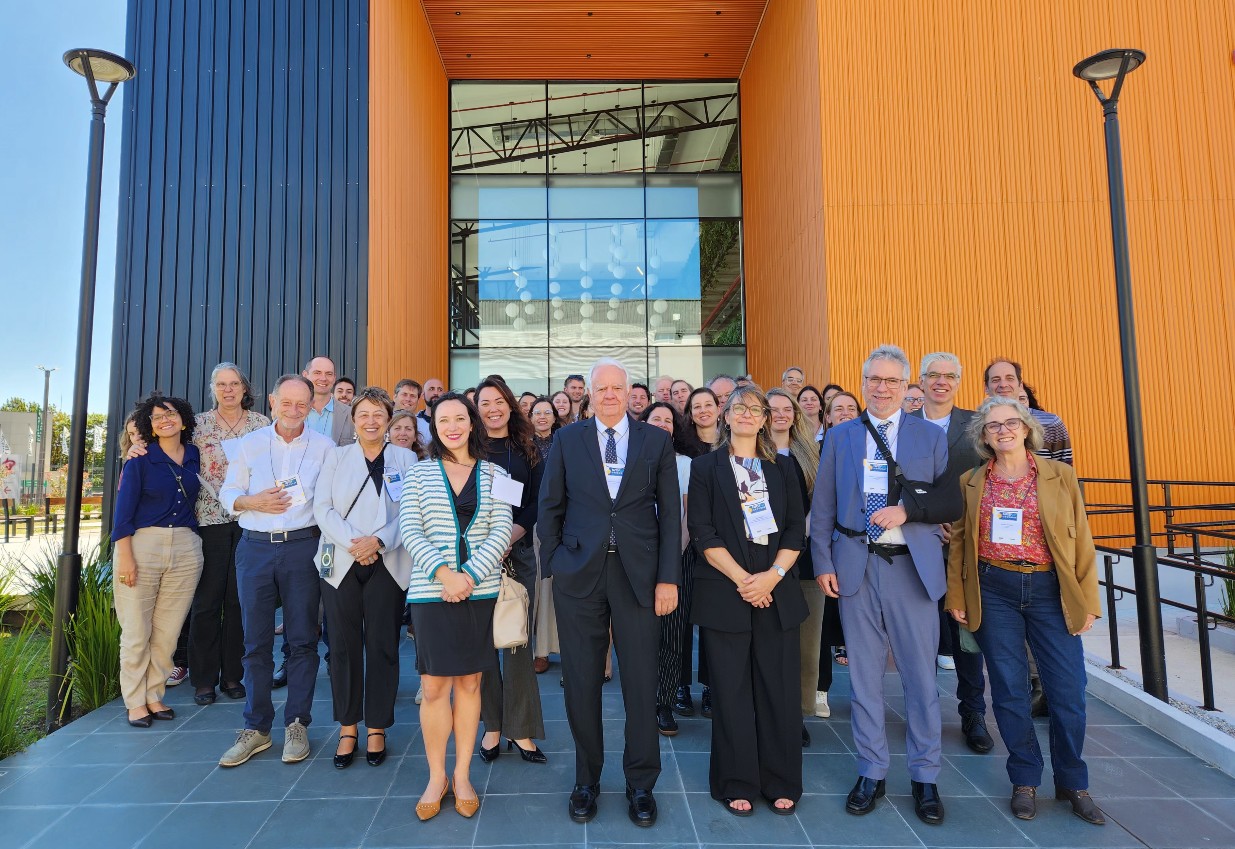

Valid for five years, the agreement was signed by Marcio de Castro and Carlos Batthyány (photo: Karina Toledo/Agência FAPESP)
One of the main objectives is to encourage collaboration between researchers from the Uruguayan institution and their counterparts at the Pasteur Institute of São Paulo.
One of the main objectives is to encourage collaboration between researchers from the Uruguayan institution and their counterparts at the Pasteur Institute of São Paulo.

Valid for five years, the agreement was signed by Marcio de Castro and Carlos Batthyány (photo: Karina Toledo/Agência FAPESP)
By Karina Toledo, from Montevideo | Agência FAPESP – Representatives from FAPESP and the Pasteur Institute of Montevideo (IPMon) met last Friday, November 14, in the Uruguayan capital to sign a scientific and technological cooperation agreement that will enable joint funding for research projects in all areas of knowledge. The agreement is valid for five years and may be extended if both parties are interested.
According to FAPESP’s scientific director, Marcio de Castro, one of the main objectives is to encourage collaboration between researchers from IPMon, inaugurated in 2007, and the Pasteur Institute of São Paulo (IPSP), which celebrated its first anniversary in March (read more at agencia.fapesp.br/51329). Both are part of the Pasteur Network, which brings together 32 laboratories in 25 countries.
“There’s a great deal of synergy in terms of topics, themes, and established competencies. And FAPESP can play a very important and influential role in this partnership. We hope that we’ll soon be able to launch a joint call between the two institutes. And who knows, maybe even expand this to greater integration with the Pasteur network as a whole. It’d be a great result of this partnership that began in South America,” said the director.
“It’s always been a goal to collaborate with FAPESP, one of the most important funding agencies in the world. The Pasteur Institute of São Paulo is a sister institute, and I believe we can work together a lot,” said Carlos Batthyány, executive director of the IPMon.
The executive director of the IPSP, Paola Minoprio, pointed out that the fact that both institutes are part of the Pasteur Network brings them closer to the expertise of different types of scientists on five continents. “In São Paulo, we’re very close to the University of São Paulo, whose expertise is fantastic. This, combined with all the support we receive from FAPESP, allows us to bring together different specialties to not only better develop science, but also train a new generation of students for scientific discovery and innovation,” she highlighted.
The FAPESP delegation’s visit to the IPMon headquarters was part of the FAPESP Day Uruguay symposium. In addition to Castro, the meeting was attended by Raul Machado, manager of the Foundation’s Institutional Relations Advisory; Niels Olsen Saraiva Câmara, advisor to the scientific director; and Ana Paula Yokosawa, deputy manager of Research Collaboration.
Call for proposals
On Friday morning, funding opportunities for researchers from Uruguay and São Paulo interested in developing collaborative projects were presented at a roundtable discussion. The discussion brought together Yokosawa and Ana Vásquez, the head of the Cooperation Unit at Uruguay’s National Research and Innovation Agency (ANII). Saraiva Câmara moderated the discussion.
Yokosawa presented data on the São Paulo science and technology system and described the various types of funding offered by FAPESP. She highlighted two programs in particular: the São Paulo Excellence Chair (SPEC) and São Paulo Researchers in International Collaboration (SPRINT) programs.
Vásquez announced that both FAPESP and ANII have joined a Belmont Forum call for proposals on oceans. The Belmont Forum is a consortium of funding agencies that aims to promote research focused on global environmental change. Entitled “Ocean 2: Towards the Ocean We Want: Biodiversity and Ecosystem Sustainability for Nature and Human Well-Being,” the call aims to promote transdisciplinary projects that address urgent ocean challenges, such as biodiversity loss and climate change. These projects are aligned with the United Nations (UN) Sustainable Development Goals (SDGs) and the Challenges of the Decade of Ocean Science. The deadline for submitting pre-proposals is March 5, 2026.
To encourage interaction between scientists from Uruguay and São Paulo so they can develop collaborative projects to submit to the international consortium, a call for proposals will soon be launched to support researcher mobility (visiting researcher modality).
“Each project must have a team from natural sciences, another from social sciences, as well as social actors. That’s very challenging. ANII will fund the groups from Uruguay and FAPESP will fund those from São Paulo, but there are many other agencies involved, so there’s the possibility of cooperation with teams from different countries,” Vásquez pointed out.
The ANII representative also announced a call for proposals scheduled for early 2026. The call is aimed at supporting projects on “microbial resistance in meat production for human consumption” and will be launched under the PILAR (Proyectos de Investigación Latinoamericana en Red – Latin American Research Network Projects) initiative. PILAR brings together FAPESP, ANII, the National Scientific and Technological Research Council (CONICET) of Argentina, and the National Science and Technology Council (CONACYT) of Paraguay.

FAPESP Day Uruguay symposium was held in November 13-14 in Montevideo (photo: Karina Toledo/Agência FAPESP)
More information about the FAPESP Day Uruguay symposium is available at fapesp.br/week/2025/uruguay.
Republish
The Agency FAPESP licenses news via Creative Commons (CC-BY-NC-ND) so that they can be republished free of charge and in a simple way by other digital or printed vehicles. Agência FAPESP must be credited as the source of the content being republished and the name of the reporter (if any) must be attributed. Using the HMTL button below allows compliance with these rules, detailed in Digital Republishing Policy FAPESP.





